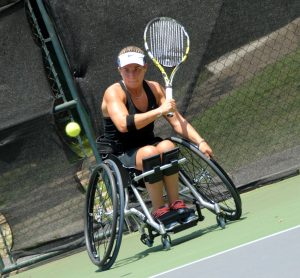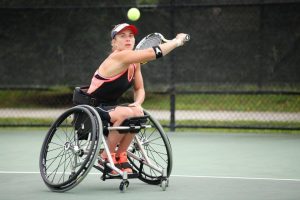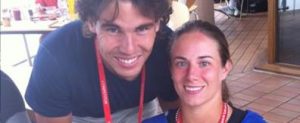Earlier this week I was privileged to have the opportunity to interview Lucy Shuker. For anyone who doesn’t know, Lucy is an British wheelchair tennis player, ranked #7 in the world at singles and #8 in the world in doubles.
Lucy’s life changed forever in 2001 when, just 12 days after getting her motorbike licence she was in an horrific accident that left her paralysed from the chest down.
Having previously been a keen horse rider and talented badminton player the accident served only temporarily to slow her down and a meeting with Paralympic Gold Medallist Pete Norfolk set her on the path to become a highly talented wheelchair tennis player.
Despite being one of the more disabled players on the tour, Lucy has competed among the World’s best at all four major tennis Grand Slams and represented Great Britain at both the Beijing 2008 and London 2012 Paralympics, and now she is getting set for Rio.
Having achieved the bronze medal in London, Lucy is now aiming for gold in Rio alongside her GB doubles player Jordanne Whiley and she is working hard to achieve that dream.
We caught up with Lucy after training – here is the full Q&A session:
4tlos: How are you preparing for Rio:
 Lucy: My training base is at Taunton Tennis Club however I also attend National Training at both Bisham Abbey and the National Tennis Centre in Roehampton. I recently attended a two week doubles camp at Bisham Abbey.
Lucy: My training base is at Taunton Tennis Club however I also attend National Training at both Bisham Abbey and the National Tennis Centre in Roehampton. I recently attended a two week doubles camp at Bisham Abbey.
4tlos: What is a normal day for you?
Lucy: I do 2 hours individual tennis training with my coach, then I’ll take a lunch break or have 1 hour fitness training. This is followed by another 2 hours training in the afternoon – perhaps with academy squad players in Taunton (it is very valuable to be able to play with different players). Then I will take a break and finish off with an hour in the gym.
I usually train Monday to Friday and then take a couple of days for rest and recovery over the weekend – since I always have to be aware that only one quarter of my body is working and even on rest days my upper body is getting a work-out.
4tlos: How do you spend your rest days?
Lucy: I may take a massage, spend time with friends and family, go shopping or do admin, (boring but necessary).
 4tlos: We are coming up to Roland Garros – and the clay court season, but which surface is your favourite?
4tlos: We are coming up to Roland Garros – and the clay court season, but which surface is your favourite?
Lucy: The easiest surface for me is a hard court but I really enjoy playing on clay and the high bounce gives me a chance to get my shots in – I use a lot of top spin and also drop shots.
Equally, it will be a challenge to play at Wimbledon this year in the Singles event as this is the first year that singles is featured for wheeelchair tennis, previously it has been a doubles only event. I have been fortunate to play in 3 finals at the Championships but I would of course love to claim a title at my home Grand Slam. It will be tough for us playing singles on the grass, I imagine that there won’t be any long rallies – it will be pretty much serve/volley.
Each of the surfaces throws up different challenges but I love playing tennis and enjoy playing whatever the surface.
4tlos: Your doubles partner for GB events is Jordanne Whiley, do you have one particular player you will partner with for Roland Garros and Wimbledon?
Lucy: At Roland Garros I will double with Dutch player Marjolein Buis – we play well together, complement each other well and I am looking forward to it.
However, for Wimbledon, we are waiting to see who gets the wild card. The Grand Slam tournaments consist of the top 7 seeded players and then a wild card, I will either play with Marjolein again or with German player Sabine Ellerbrock – we wait and see, wild cards will be announced soon.
Source: Lucy Shuker
Lucy: Yes of course, but it’s something I work on with my sports psychologist.
4tlos: It’s good to see that in wheelchair tennis there is an even split between men and women in the Grand Slam events, is it always like that?
Lucy: In the Paralympics the split between male and female athletes is 64/32.
4tlos: I notice that you are raising funds for your trip to Rio – do all wheelchair tennis players struggle for the funding required in order to get to these major events?
Lucy: We receive funding from the Tennis Federation (British Wheelchair Federation) and the Lottery Fund, however, I would like to be able to take my personal coach with me to Rio and obviously that involves 3 weeks salary, accommodation and flights, hence the need to fund-raise.
The Federation will provide a national coach, physio, massage therapist, but it would make all the difference to me to be able to have my personal coach with me.
4tlos: Prize money is increasing at the Grand Slam events is that helping?
Lucy: Of course, and Wimbledon have just raised the bar again, but there isn’t a limitless supply of money out there and it’s a huge way off from able-bodied sport. It is a struggle travelling the world and competing in the number of events necessary in order to maintain a high ranking, which enables automatic qualification to the majors. Sometimes we barely manage to cover the costs of getting to events but I love what I am doing and feel lucky to be in this position.
4tlos: What are your ambitions beyond Rio?
Lucy: I would like to make it to the Tokyo Paralympics, I hope I have 4 to 5 years left to be able to compete at a high level. After that I would like to give back to this sport that has already given me so much.
At the moment I do a number of public appearances, which may involve going into schools to talk to children or businesses as a motivational speaker. Taunton Tennis Club also has a wheelchair club and I enjoy meeting people new to wheelchair tennis as it’s a sport that has given so much to my life.
4tlos: Finally, do you have any time to follow other sports and do you have any sporting role models?
Lucy: I enjoy following all kinds of sports and recently I watched Amir Khan hoping he would win his match. I also love to watch able-body tennis and think that Rafa Nadal is a great role model. He is always so respectful on court and he works amazingly hard and never gives up.
4tlos: Have you met Rafa?
 Lucy: I have been lucky enough to meet many of the top players, its exciting to play at the Grand Slams where you are competing alongside the top names in the sport, sharing the facilities and locker rooms with them. I met Rafa at Wimbledon a few years ago.
Lucy: I have been lucky enough to meet many of the top players, its exciting to play at the Grand Slams where you are competing alongside the top names in the sport, sharing the facilities and locker rooms with them. I met Rafa at Wimbledon a few years ago.
I would also like to give credit/respect to Andy Murray, another really hard working tennis player who gave up some of his personal ambitions on court last year in order to help the GB Davis Cup team win.
Both these players are great motivators for youngsters coming through.
———————————————————————————————————————————————————–
We would like to thank Lucy for giving her time to talk to us and wish her all the best for Roland Garros, Wimbledon and of course Rio. We look forward to following her successes and reporting it here.
One final comment from us on the differences between able body and wheelchair tennis – it seems ironic that the top tennis players earn a fortune and are followed around the world by a considerable entourage, while a wheelchair tennis player cannot afford to have their own coach, let alone physio, massage therapist – people you would think to be essential to the comfort and well-being of these athletes. The world is a very strange place.
If you would like to support Lucy in her fund raising you can contribute here: https://www.pledgesports.org/projects/wheelchair-tennis-sponsorship-lucy-shuker/
And if you are inspired by Lucy’s story and would like to find out about her and her many achievements you can visit her website here.









